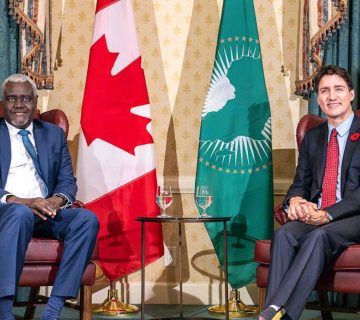Zimbabwe has been under the rule of the Zimbabwe African National Unity-Patriotic Front (ZANU-PF) since independence in 1980. Sudan, on the other hand, has been under the rule of the National Congress Party since 1996. While President Omar Bashir has been in power since 1989, Zimbabwe’s Robert Mugabe, hitherto his ousting in 2018, was the president since 1980. Both countries have been placed under international sanctions – Zimbabwe since 2002, while Sudan from 1997 to 2017. The two countries were, however, sanctioned for different reasons: concerns for democracy and human rights in Zimbabwe; and allegation of terrorism, human rights and security in Sudan.
The impact of these sanctions has been huge, especially on their economies and their autocratic leaders’ legitimacy over time. Sudan’s economy was further weakened by South Sudan’s secession, which reduced Sudan’s oil reserves by 75 per cent. Former Zimbabwe president, Robert Mugabe, was rejected by the people and the establishment in 2018, leading to his resignation. The Sudanese president, Omar Bashir, has been facing anti-government protests since December 2018, and there are popular calls for resignation.
The Missed Opportunities
Even though Zimbabwe’s Robert Mugabe finally left office, the military and his long-time political networks filled the vacuum. The then vice president, Emerson Munangagwa took office as President and appointed the army chief, Constatino Chiwenga, his Vice President. This reality dimmed the democratic change euphoria, re-awakening agitations for change that were channelled through the ballot three months later. The outcome of the elections was disputed as the opposition candidate, Nelson Chiwenga claimed massive irregularities and rigging. The military and police cracked down on protests leading to deaths and arrests of civilians. President Munangagwa managed to retain his seat amid protests, but the country remained subject to financial sanctions.
In Sudan, the lifting of sanctions in 2017, and the South Sudan peace deal of September 2018, allowed the resumption of meaningful oil drilling since 2013. These events provided Sudan a fresh start and room for economic investment and growth. However, systemic corruption and abuse of power have persisted amid calls for reforms and change, thus deepening popular resentment.
Anti-Government Protests
In December 2018, President Bashir’s bid for a third term, aided by possible constitutional amendments by the NCP, flew in the face of the rising cost of life in Sudan. Food shortages and increase in food and fuel prices provoked mass anti-government protests, which have been running since December 19, 2018. Protesters are now calling for Bashir to step down.
Similarly, Zimbabwe has been experiencing anti-government protests since January 14, 2019, occasioned by fuel price hikes related to cash crunch, which translated to price inflation of other commodities dependent on fuel, such as food. The overall effect has been the rise of the cost of living.
The protests across cities in Sudan have been met with tough crackdowns involving internal security agencies, the military, the police and the National Intelligence Security Service (NISS). The results of such measures have been the shutdown of internet, killings of protesters, and arrests of civilians. Such human rights violations and excessive use of force have masked the hope of Bashir’s relief pledges on food prices and income.
Similar scenarios are playing out in Zimbabwe, with military and police being involved in crackdown operations against the protesters. The internet was shut down, protesters killed, and arrests of civilians made. Additionally, there have been claims of systematic torture of civilians by the military.
Important Questions
It is clear Sudan’s Bashir has lost his legitimacy and anti-government protests will only escalate with time. However, should he resign now when elections are due in 2020? With the military backing President Bashir, is it easy to have him step down only by popular protests? With the ruling party having already endorsed his 2020 presidential bid, and commanding the majority in parliament, can the party reconsider his party leadership position, impeach him and put public interest first?
What will stop the military-ruling party alliance in Sudan from hijacking power in the event of Bashir’s fall? With Zimbabwe having been out of elections barely six months ago, is it feasible for President Munangagwa to step down fresh into his first term in office? With the military and security agencies backing Munangagwa, are popular protests enough to further the anti-government cause? With ZANU-PF commanding the majority in parliament, lacking no powerful replacement for Munangagwa, will it reconsider his party leadership position, impeach him and put the public interest first? In both cases, are the security crackdowns viable options out of the political crises? Does legitimacy matter anymore if the establishments’ struggle is for keeping power?
Options
For Sudan, President Bashir, sure of unyielding protests and counter-productive crackdowns, should step down and allow for elections, after a consultative dialogue with opposition parties on a framework for democratic transition. For Zimbabwe, President Munangagwa should embrace dialogue with the main opposition, the Movement for Democratic Change (MDC), and if possible, form a government of national unity. This will afford his mandate enough legitimacy, international approval, stabilize the country, and help his pitch for the lifting of sanctions for the sake of economic reconstruction. Both presidents should limit the involvement of the military in politics, and the use of force by internal security agencies against protests. Both should allow free and equal participation of opposition groups, and tolerate dissent. Short of such measures, economic pressures will worsen both governments’ legitimacy deficit, and international moral standing, which is important for international cooperation and assistance.
Edmond J. Pamba is a Research Assistant at the HORN Institute.
Photo Credit: Reuters



